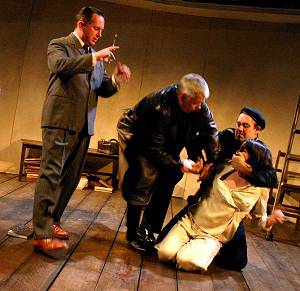On fire with poetry
What might have happened, Sean O'Brien asks in his
programme note, if a "gifted young poet" in the 1930s had taken up right-wing
politics, instead of the Auden generations allegiance to the Left? Keepers
of the Flame offers a disturbing answer. It shows O'Brien's protagonist
Richard Jameson as a derelict shell in 1987, his poetic gift long gone, though
its legacies are still coveted by factions of extreme Conservatism and the
National Front. Sections dramatizing his memories also explore the loss of his
talents through involvements in 1930s politics: principally his seduction by a
Mosley-like organization which seeks only propaganda and "marching songs, no
end / of bloody marching songs".
Both phases, past and present, offer a dire prospect
of a poet forced to betray his principles, his relationships, his writing, and
ultimately himself. As in his earlier verse play for Live Theatre, Laughter
When We're Dead (reviewed in the TLS, June 30, 2000), Keepers of the
Flame is unrelenting in its depiction of the seductive corruptions of
politics and power. As allusions to Faustus confirm, O'Brien is a
Mephistophelean playwright, interested in characters carried beyond any glimmer
of redemption; and in taking the audience, along with them, down to hell with
ease. The result might well have been an excessively - perhaps implausibly -
gloomy evening in the theatre.
Many factors prevent this. First among these is the
quality of the performances. In a demanding part, Alan Howard persuasively
conveys both Jameson's 1980s decrepitude and despair, yet also the edgy realism
and egotism which preceded it. David Rintoul projects into the Mosley figure a
brusque self-certitude both sinister yet plausibly alluring. Other members of
an outstanding cast likewise endow every syllable and gesture with controlled
vigour and wilfulness, so that power and its fascinations seem to exude from
every movement of the play. Yet its action is never allowed to lurch towards
melodrama; scenes of horrible violence are thoroughly unstagey, and
convincing.
|
So is O'Brien's blank verse. It is delivered
much as T.S.Eliot might have recommended: with a naturalness which makes it
undistracting as poetry. Yet in lyric interludes, or at moments of heightened
tension, it bears comparison with Faustian or Jacobean antecedants also
recalled by O'Brien's dark vision of lusts and treacheries. Nor is this
linguistic power an incidental grace: rather it is integral to some of the
wide-ranging questions Keepers of the Flame explores. Several of these
are straightforwardly political. Like Simon Armitage, in recent poems such as
The Twang, O'Brien scrutinizes English nationalism and the risks of its
appropriation by the Right, often the far Right, pondering the possibilities of
being "a patriot" without going "much further out". |

|
Like Armitage, too, O'Brien examines the relation of
nationalism, and its moral and imaginative base, with the Platonic England of
the countryside. "On fire / With poems and plays and operas and films / And
England, England, England", it is to "a core of light / Among the oak and ash"
that Jameson turns, like so much English writing, for his
inspiration.
O'Brien's profoundest questions, however, are about
relations between poetry and a world of action more generally. Like Theodor
Adorno, concerned about the validity of lyric poetry after Auschwitz, O'Brien
questions how poets, or even words themselves, could continue to serve the
world in a century of unremitting violence, destruction, and political
immorality. Even in the 1930s, Jameson's Oxford tutor concludes that "our age
is what comes after poetry", and that "poetry / Is finished ....... a language
of the dead, / A world we study when the action's done". Young and idealistic,
Jameson nevertheless remains convinced that "poetry is England", and that a
poetic talent for "putting pictures in your head" is ennobling and enabling - a
way of redirecting the lived, actual world through the power of the
imagination. Later, poetry seems to him merely a form of cowardice and evasion:
a betrayal of that lived world, and a flight from its
responsibilities.
Tensions between these views raise artistic, critical
and moral challenges which make for an absorbing evening in the theatre. This
is a thoughtful play, excellently produced, with particular resonance for any
reader of the life of the twentieth century, or of its poetry: ultimately, for
anyone who works much with words at all.
Randall Stevenson
Times Literary Supplement,
21.11.03.
Back to Keepers
of the Flame page.
